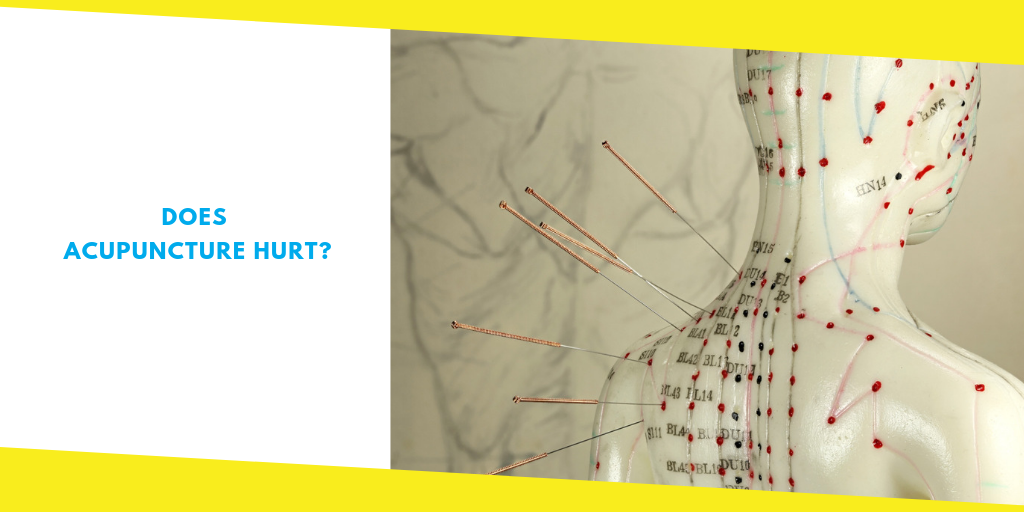Does Acupuncture Hurt? Here Are Some Things To Expect While Getting Acupuncture
This post was last updated on June 27th, 2022

Around 36 percent of American adults use some form of complementary and alternative medicine (CAM), with most of these favoring practitioner-based methods such as chiropractic care and acupuncture.
Since it was introduced to the US in 1970, acupuncture has attracted an increasing amount of public interest every year. In fact, acupuncture use almost doubled from 8.19 million people to 14.01 million people between 2002 and 2007.
But, while it’s great that people are seeking alternative treatments for specific health conditions, what we all really want to know is, does acupuncture hurt?
Read on to find out all about acupuncture, including whether it hurts or not and how it could help you.
Contents
ToggleWhat Is Acupuncture?
Acupuncture is a Traditional Chinese Medicine (TCM) practice which originated over 2,500 years ago. It follows the premise that a blockage in the flow of the body’s life energy, or ‘qi’ (pronounced ‘chi’), can cause health problems.
A qualified and experienced acupuncturist aims to resolve these problems by inserting thin needles into specific points of the body. This practice then restores the flow of qi to regulate your physical, mental, and emotional health.
How Does Acupuncture Work?
TCM theory states that there are over 1000 acupuncture points on the body. Each of these lies on an energy channel, or ‘meridian’, where each meridian links to a different organ system. TCM acupuncturists believe that, by inserting needles into specific points along these meridians, they can re-balance your energy flow.
In contrast, Western practitioners view acupuncture points as locations around the body to stimulate the autonomic nervous system. This then causes a release of chemicals that help to control pain, reduce inflammation, regulate blood flow, and calm the brain.
Acupuncture Uses and Benefits
Although practitioners now use acupuncture to promote good health and reduce stress, acupuncture is most often used to treat various forms of pain and its causes. These can include:
- neck pain
- menstrual cramps
- labor pain
- headaches and migraines
- dental pain
- lower back pain
- rheumatoid arthritis
- fibromyalgia
Some other conditions that acupuncture can treat include:
- allergies
- high blood pressure
- anxiety and depression
- insomnia
- osteoporosis
- chemotherapy-induced or postoperative nausea and vomiting
- respiratory problems
Despite acupuncture’s long history and growing popularity in the West, some studies compare acupuncture benefits to those of a placebo.
Researchers behind these studies believe that it is the patient’s belief in the treatment which makes it effective rather than the treatment itself. But, this theory fails to explain how veterinary acupuncture is a successful treatment for a variety of conditions in animals.
Not to mention, there are many more studies which show how acupuncture patients have experienced great improvement in their condition. So, if you’re wondering, ‘should I see an acupuncturist?’, there’s a lot of evidence to suggest that it could be beneficial to at least try this method for yourself.
Does Acupuncture Hurt?
One common misconception about acupuncture is that it hurts. And often, this is a key reason for people’s reluctance to try it.
Although sticking needles into your skin looks and sounds like it would be painful, acupuncture isn’t meant to hurt. Instead, it’s meant to cause mild sensations of tingling, heaviness, or throbbing. Although, all these sensations are positive responses to the treatment.
The extent to which you feel these sensations depends on your sensitivity and pain tolerance. It’s also important to stress that your first acupuncture treatment may involve a little more discomfort than follow-up treatments.
But, this comparable to the way that your first massage session or chiropractic treatment can often prove more painful than your next visits. You should see this discomfort as a sign that the acupuncture treatment is activating certain muscles and nerves for the first time.
Recommended: Facts and Myths about Acupuncture
What to Expect from an Acupuncture Appointment
Now you know more about acupuncture, here’s what to expect when you book an acupuncture appointment with a certified TCM Singapore practitioner:
During Treatment
First, your acupuncturist will tell you where on your body they will insert the needles during treatment. Sometimes, the specific points are nowhere near wherever you are experiencing pain.
Depending on the treatment area, you may need to remove some clothing and cover yourself with a sheet or towel. Then, while you lie on a padded table, your acupuncturist will follow these three steps:
-
Insertion
The practitioner will insert very thin needles into strategic points on your body to various depths. A typical treatment involves around five to 20 needles. Depending on the practitioner’s needling technique, you may not feel these needles at all. Or, you may feel a mild aching sensation once the practitioner applies the needle to the correct depth.
Inform your practitioner if you experience pain that goes beyond mild discomfort. Your practitioner can then proceed at a slower pace, use fewer needles, or reduce the depth of needle application.
-
Manipulation and Relaxation
After inserting the needles, the acupuncturist may twist or move the needles. Depending on the specific treatment, your practitioner may also apply mild electrical pulses or heat to the needles.
Your practitioner will then leave you to lie still and relax for around 10 to 20 minutes with the needles in place. During this period, you will have access to a buzzer to call for help should you need it.
-
Removal
After the allotted time, your practitioner will return to the room and remove the needles. Removing the needles shouldn’t cause any pain or discomfort.
After Treatment
Following their first acupuncture appointment, some people feel relaxed while others feel energized. You may also experience mild side effects, including minor soreness, bleeding, or bruising at the needle insertion points.
Several of the reported benefits following acupuncture include better quality sleep, improved flexibility, and reduced pain. Although, some people feel no difference after an initial acupuncture session.
For this reason, most practitioners recommend several treatment sessions to see if your condition improves. But, if you don’t experience any change after a few weeks, acupuncture may not be the right treatment for you.
Your Guide to Acupuncture
Now you know the answers to all your acupuncture-related questions, including, ‘what is acupuncture?’, ‘how does it work?’, and, ‘does acupuncture hurt?’, you might be wondering whether it could be a good option for you.
Of course, the only way to find out is to try acupuncture for yourself. And, now you know that it has many potential benefits and few side effects, you’ll see that it’s definitely worth considering.
For more health-related advice and inspiration, be sure to check out our other blog posts!
Recommended For You
Practical Tips to Sleep Better When You Are Suffering From Allergies
Most Inside
Most Inside offers high-quality recommendations and valuable updates to enhance all aspects of your life, providing premium guidance and enriching experiences.




